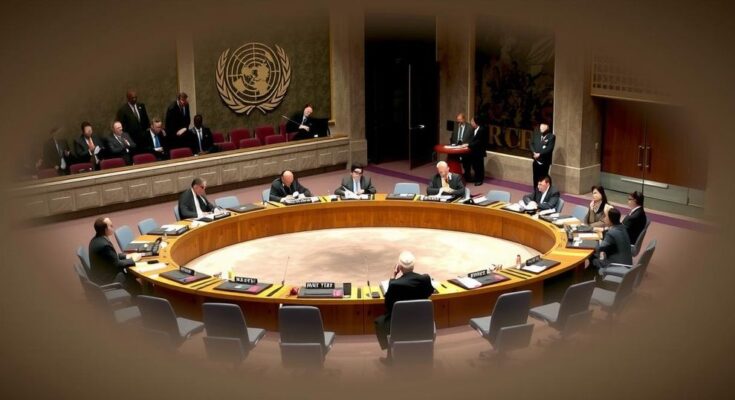Pakistan has begun its two-year term as a temporary member of the UNSC, raising concerns over its potential use of this position to promote its geopolitical agenda, particularly regarding anti-terrorism and Kashmir. Despite pledges to combat terrorism, historical precedents of state-sponsored terrorism call into question the sincerity of its commitments.
On January 1, 2025, Pakistan commenced its two-year term as a temporary member of the United Nations Security Council (UNSC), marking the eighth occasion the country has held this position. Pakistani officials portray this membership as an opportunity for the nation to engage in resolving global issues; however, this development leads to significant apprehensions, particularly from India. Concerns arise regarding Pakistan’s historical use of terrorism to further state objectives and the potential for it to manipulate its UNSC role to fulfill its geopolitical aims.
Pakistani ambassador Munir Akram expressed the country’s intention to pursue “active and constructive solutions” to pressing global challenges, notably in combating terrorism. While such intentions appear commendable in theory, they conflict with Pakistan’s controversial record of harboring and supporting terrorist organizations, especially in relation to India and Afghanistan. The nation’s complicity in attacks executed by groups like Lashkar-e-Taiba and Jaish-e-Mohammad raises serious doubts about the sincerity of its anti-terrorism pledges at the UNSC.
The UNSC, comprising 15 members, including five permanent members, possesses the critical function of upholding international peace and security. Pakistan’s tenure will last from January 1, 2025, to December 31, 2026, following its replacement of Japan for the Asian seat. Although Pakistan lacks veto power, its participation in voting and resolution shaping remains pivotal, facilitating its influence in specific discussions, especially in strategic alliances.
India is apprehensive regarding Pakistan’s UNSC accession, particularly its usage of the platform to reiterate its stance on Kashmir. Historically, Pakistan has leveraged international forums to bring attention to the Kashmir issue and is expected to perpetuate this trend at the UNSC. Moreover, Pakistan’s membership may provide access to influential committees that manage sanctions related to terrorism. Despite professing dedication to anti-terror efforts, there is concern that Pakistan could impede measures against terrorist entities or oppose sanctions affecting groups operating within its political sphere.
As a UNSC member, Pakistan has the potential to shape global discourses and project its influence, particularly among Islamic nations by positioning itself as an integral player in counter-terrorism. Nonetheless, its historical behavior presents a challenge to its ability to act genuinely and responsibly on the Security Council. The international community, especially India, must vigilance monitor Pakistan’s conduct to ascertain whether its actions genuinely reflect its stated commitments.
In summary, Pakistan’s professed intent to combat terrorism through its UNSC membership must be critically examined in light of its past support for entities that engage in cross-border terrorism. As Pakistan embarks on its temporary role in the UNSC, it is imperative for global actors to remain alert and assess whether its actions will align with its rhetoric, or whether it will pursue its geopolitical objectives at the detriment of both regional and global stability.
Pakistan’s recent ascension to the UNSC as a temporary member highlights its complex geopolitical situation, particularly its contentious relationship with India. This membership occurs amidst Pakistan’s alleged historical practices of utilizing terrorism as a statecraft tool, which raises international concerns over its intent in counter-terrorism discussions. The geopolitical dynamics between India and Pakistan significantly influence the perception of Pakistan’s role within the UNSC.
In conclusion, while Pakistan’s new role in the UNSC presents an opportunity to demonstrate its commitment to global peace and security, its history challenges the likelihood of such a commitment being genuine. Observing Pakistan’s actions during its term will be essential in determining whether it will engage in constructive diplomacy or prioritize its national interests, particularly concerning its longstanding agenda against India.
Original Source: www.financialexpress.com




